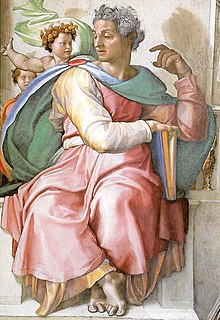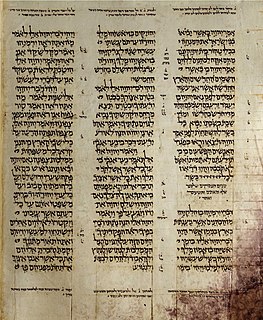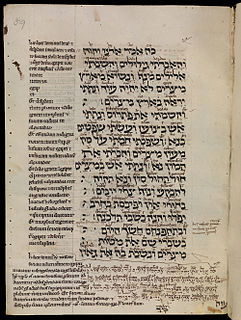Related Research Articles

In the Hebrew Bible, Hosea, son of Beeri, was an 8th-century BCE prophet in Israel and the nominal primary author of the Book of Hosea. He is the first of the Twelve Minor Prophets, whose collective writings were aggregated and organized into a single book in the Jewish Tanakh by the Second Temple period, forming the last book of the Nevi'im; but which writings are distinguished as individual books in Christianity. Hosea is often seen as a "prophet of doom", but underneath his message of destruction is a promise of restoration. The Talmud claims that he was the greatest prophet of his generation. The period of Hosea's ministry extended to some sixty years, and he was the only prophet of Israel of his time who left any written prophecy.

Isaiah was the 8th-century BC Israelite prophet after whom the Book of Isaiah is named.

The haftara or haftorah "parting," "taking leave", is a series of selections from the books of Nevi'im ("Prophets") of the Hebrew Bible (Tanakh) that is publicly read in synagogue as part of Jewish religious practice. The haftara reading follows the Torah reading on each Sabbath and on Jewish festivals and fast days. Typically, the haftara is thematically linked to the parashah that precedes it. The haftara is sung in a chant. Related blessings precede and follow the haftara reading.

Hosea 1 is the first chapter of the Book of Hosea in the Hebrew Bible or the Old Testament of the Christian Bible. This book contains the prophecies attributed to the prophet Hosea son of Beeri, and this chapter especially sets forth the spiritual whoredom of Israel by symbolical acts. It is a part of the Book of the Twelve Minor Prophets.
Isaiah 1 is the first chapter of the Book of Isaiah, one of the Book of the Prophets in the Hebrew Bible, which is the Old Testament of the Christian Bible. In this "vision of Isaiah concerning Judah and Jerusalem", the prophet calls the nation to repentance and predicts the destruction of the first temple in the siege of Jerusalem. This chapter provides an introduction to the issues of sin, judgement, and hoped-for restoration which form the overarching structure of the whole book. It concludes with 'a reference to the burning of those who trust in their own strength', in a fire which cannot be 'quenched', a relatively rare word which is also used in the last verse of the book, thereby linking together beginning and ending of this whole book. It is traditionally read on the black sabbath immediately preceding the 9th of Av fast day.
Isaiah 5 is the fifth chapter of the Book of Isaiah in the Hebrew Bible or the Old Testament of the Christian Bible. This book contains the prophecies attributed to the prophet Isaiah, and is one of the Books of the Prophets.
Isaiah 19 is the nineteenth chapter of the Book of Isaiah in the Hebrew Bible or the Old Testament of the Christian Bible. This book contains the prophecies attributed to the prophet Isaiah, and is one of the Books of the Prophets. This chapter focuses on Egypt.
Isaiah 43 is the forty-third chapter of the Book of Isaiah in the Hebrew Bible or the Old Testament of the Christian Bible. This book contains the prophecies attributed to the prophet Isaiah, and is one of the Books of the Prophets.

Hosea 2 is the second chapter of the Book of Hosea in the Hebrew Bible or the Old Testament of the Christian Bible. This book contains the prophecies attributed to the prophet Hosea son of Beeri and this chapter contains the application of the symbols in the first chapter. It is a part of the Book of the Twelve Minor Prophets.

Hosea 4 is the fourth chapter of the Book of Hosea in the Hebrew Bible or the Old Testament of the Christian Bible. This book contains the prophecies attributed to the prophet Hosea son of Beeri. In this chapter he reproves the people and priests for their sins in the interregnum following Jeroboam's death; hence there is no mention of the king or his family; and in Hosea 4:2 bloodshed and other evils usual in a civil war are specified. It is a part of the Book of the Twelve Minor Prophets.

Hosea 9 is the ninth chapter of the Book of Hosea in the Hebrew Bible or the Old Testament of the Christian Bible. This chapter contains the prophecies attributed to the prophet Hosea son of Beeri, about the distress and captivity of Israel for their sins, especially their idolatry. It is a part of the Book of the Twelve Minor Prophets.

Hosea 11 is the eleventh chapter of the Book of Hosea in the Hebrew Bible or the Old Testament of the Christian Bible. This chapter contains the prophecies attributed to the prophet Hosea son of Beeri, about God's former benefits, and Israel's ingratitude resulting in punishment, but God still promises restoration. It is a part of the Book of the Twelve Minor Prophets.

Hosea 12 is the twelfth chapter of the Book of Hosea in the Hebrew Bible or the Old Testament of the Christian Bible. This chapter contains the prophecies attributed to the prophet Hosea son of Beeri, and was delivered about the time of Israel's seeking the aid of the Egyptian king So, in violation of their covenant with Assyria. He exhorts them to follow their father Jacob's persevering prayerfulness, which brought God's favor upon him. As God is unchangeable, He will show the same favor to Jacob's posterity as He did to Jacob, if, like him, they seek God. It is a part of the Book of the Twelve Minor Prophets.

Hosea 13 is the thirteenth chapter of the Book of Hosea in the Hebrew Bible or the Old Testament of the Christian Bible. The book contains the prophecies attributed to the prophet Hosea son of Beeri. This chapter and the next one may belong to the troubled times that followed Pekah's murder by Hoshea. The subject is the idolatry of Ephraim, notwithstanding God's past benefits, destined to be his ruin. It is a part of the Book of the Twelve Minor Prophets.

Jeremiah 2 is the second chapter of the Book of Jeremiah in the Hebrew Bible or the Old Testament of the Christian Bible. This book contains prophecies attributed to the prophet Jeremiah, and is one of the Books of the Prophets. Chapters 2 to 6 contain the earliest preaching of Jeremiah on the apostasy of Israel. Verses 2:1 to 3:5 dramatize the ending of "marriage" between Yahweh and Israel.

Ezekiel 17 is the seventeenth chapter of the Book of Ezekiel in the Hebrew Bible or the Old Testament of the Christian Bible. This book contains the prophecies attributed to the prophet/priest Ezekiel, and is one of the Books of the Prophets. This chapter tells, and then interprets, the riddle of the great eagle.

Ezekiel 23 is the twenty-third chapter of the Book of Ezekiel in the Hebrew Bible or the Old Testament of the Christian Bible. This book contains the prophecies attributed to the prophet/priest Ezekiel, and is one of the Books of the Prophets. This chapter forms part of a series of "predictions regarding the fall of Jerusalem", and is written in the form of a message delivered by God to Ezekiel. It presents an extended metaphor in which Samaria and Jerusalem are compared to sisters named Oholah (Samaria) and Oholibah (Jerusalem), who are the wives of God and accused of "playing the whore" in Egypt then cuckolding her husband while he watched.

Jeremiah 16 is the sixteenth chapter of the Book of Jeremiah in the Hebrew Bible or the Old Testament of the Christian Bible. This book contains prophecies attributed to the prophet Jeremiah, and is one of the Books of the Prophets. In the first part of this chapter, Jeremiah is instructed to adopt a lifestyle which will serve as a "symbolic enactment of God's word", comparable to the instructions given to other prophets: see Hosea 1:2–9, Isaiah 8:3–4 and Ezekiel 24:15–24.
References
- 1 2 Cambridge Bible for Schools and Colleges on Isaiah 19, accessed 2 April 2018
- ↑ BibleGateway.com, Translations of Hosea 9:6